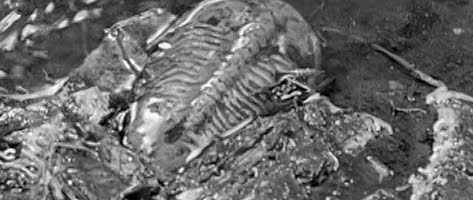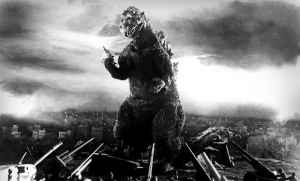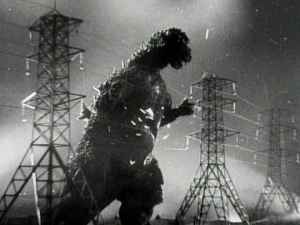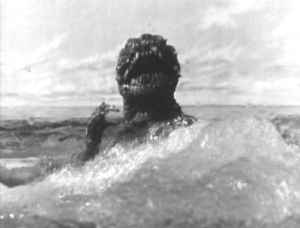Godzilla as a Man-Made Force of Nature: A Monstrous Contradiction
The man-made monstrosity taking revenge on its creators for daring to push science to its limits is a well-worn trope in science fiction film and literature. This concept was used to full effect in the years following World War II, when fear of the atomic bomb and its destructive potential was arguably at its highest point, and science was viewed as a double-edged sword which could simultaneously bring great prosperity and horrifying destruction. The most famous example of the nuclear scare’s personification in science fiction is the king of the monsters himself, Godzilla. Godzilla, however, is a bit more complex than the average radioactive monster from the 1950’s. While plenty of films made during this period deal with similar subject matter, Godzilla is unique in that it is characterized as both the result of man manipulating natural forces in an unnatural way and as a force of nature himself.
Godzilla’s origins, abilities, and temperament tend to change from film to film, so for the sake of simplicity the focus will be on the first, eponymous film, Godzilla (1954). In this particular film, Godzilla is said to have been released by, rather than created by, the nuclear weapons testing with which he has become so closely associated. In this sense the act of unnaturally splitting hydrogen atoms, effectively defying one of the four natural forces that define how matter behaves in our universe, has resulted in a horrible backlash. Not only is the force that awakened or released Godzilla unnatural, but Godzilla’s very presence in our world is shown to be unnatural. Shortly before the monster’s first on-screen appearance, some of the film’s main characters stumble across enormous radioactive footprints and a trilobite. Godzilla’s saurian appearance and the presence of extinct, prehistoric species in his wake suggest that he is a creature living in the wrong era, a monster that by sheer force of will or survival skill has persisted long after other species like him have perished. This shows that the unnatural act of nuclear weapons testing has resulted in a creature from a time very different from our own being thrust into the modern era, resulting in an unnatural clash between epochs. In this way, Godzilla is turned into a sort of prehistoric invader of the modern world, and the havoc that it wreaks across Japan is a clear indication of the friction caused by its presence in the wrong type of world.

While Godzilla’s origins are decidedly unnatural, its actions and effect on the world around it are strongly reminiscent of a force of nature or natural disaster. Godzilla’s first venture onto shore occurs off-screen during a vicious storm, and the monster’s roars are misconstrued by some as the natural sounds of the intense wind and rain. The parallels between the monster and the storm are readily apparent; both are powerful destructive forces that seem to have no regard for human life, both approach from the sea and devastate the island and its inhabitants, and both arrive in the night but leave before their terrified victims have the chance to fully understand the scope of what is happening. Later on in the film, when Godzilla makes its climactic assault on Tokyo, he again strikes with the speed and unpredictability of a natural disaster. Conventional military tactics have no effect on it and man-made structures are no match for its unspeakable destructive power.

Following the decimation of Tokyo, the Japanese military attempts to ward Godzilla off using a line of high voltage electrical towers, but Godzilla shrugs off the powerful jolt of electricity and proceeds unhindered. In much the same way that a hurricane or wildfire would simply pass by such an artificial barrier, Godzilla barely stops long enough to melt the wires strung between the towers with its atomic breath. In a way, this demonstration of tremendous strength and resilience shows that Godzilla cannot be stopped by either humans or natural forces like electricity.

Even Godzilla’s death at the end of the film suggests that it is very much like a force of nature. In order to finally end the monster’s rampage through Japan, a Japanese scientist reluctantly employs the product of his recent research: the oxygen destroyer. The oxygen destroyer works by breaking down oxygen atoms and asphyxiating and disintegrating any animals unfortunate to be caught in its path. It is only by using this incredibly unnatural device that the threat posed by Godzilla is finally ended. In order to kill the monster, mankind had to resort to once again acting against the fundamental forces that bind atoms together, giving a strange kind of symmetry to Godzilla’s reign of terror.

Much of Godzilla’s appeal as a monster in film comes from the all-encompassing and contradictory nature of his existence. It is both natural and unnatural, simultaneously a walking natural disaster that defies (almost) all of humanities attempts to restrain it and a temporally displaced invader unleashed upon the world by the breaking of that world’s most basic laws. Neither the artificial power of mankind nor the redirected power of nature can stop him, and the only thing that can possibly stop him is just as terrifying as the atrocity that freed him to run amok in the first place. All of this makes Godzilla a unique, compelling, and all-around intimidating creature in the world of science fiction, and likely one whose appeal will last for quite some time.
What do you think? Leave a comment.











Mechagodzilla has always been a favourite monster of mine, and see the King of Monsters go head to head with what is basically an evil copy of him is just classic.
I enjoy the other Mechagodzilla movies too, but this one is the BEST, although it’s all personal.
Gojira is the most important and best overall film.
I like the charm of the films from 1954-1975.
I feel the original (Japanese version) of Godzilla, wasn’t so much a Kaiju or monster film, as it was a serious, sad and sometimes even philosophical movie about the effects of nuclear weapons and mankind’s self destructive behavior and stupidity in general.
In most other Godzilla and Kaiju films you don’t have such themes anymore.
I don’t know if you’ve seen it, but the war of the gargantuas is my alltime favorite kaiju film, I love it a little more than the original Godzilla movie.It’s similar because it’s a fun exciting old school monster movie but it has great themes concerning the duality of the power of nature. I highly reccommend it. Also looking toward to the new Godzilla movie, it looks amazing and seems like it is going for the themes of the original 1954 film.
I’ve heard good things about War of the Gargantuas but I haven’t gotten a chance to see it. I think it’s on either Netflix or Hulu right now, so I may have to check it out tonight. I’ve also heard good things about Daimaijin, but mostly because it’s unique in that it’s set in feudal Japan rather than a modern or futuristic setting.
Thanks for reading! It’s definitely interesting to see the Godzilla franchise go so quickly from trying to send a pretty sincere and serious message to the silly kind of stuff you end up with in the 60’s and 70’s. At times it seems like they tried to return the franchise to its roots, like the pretty heavy environmental messages in Godzilla vs Hedorah, but even when they do try the rest of the movie tends to be more goofy than dire.
100% with you! Although I do like all action movies, the original Godzilla movie had a deeper meaning that paralleled the action.
Fascinating analysis! And just in time for the new film!
Personally, I might interpret Godzilla’s origin as an animal from a prehistoric era to indicate that he is all the more natural – he’s so natural, he’s from a time without mankind. But I think you do a good job explaining your decision to see this as unnatural – he’s unnatural because he’s in the wrong time.
I was confused, however, by the line, “Even Godzilla’s death at the end of the film suggests that it is very much like a force of nature.” You say something about animals… are you saying he dies like an animal and is therefore natural? I think your statement about the symmetry – the idea that technology got us into this mess but only technology can get us out – is more compelling and has more room for development.
Thanks for reading! I can definitely see your point about Godzilla maybe being more natural than humans as a species, especially in the context of the first film when they hadn’t yet decided that Godzilla’s origins involved being mutated by the nuclear tests. Since he’s really just a big dinosaur doing what big dinosaurs do, it’s almost more unnatural for us to try to stop him. With the closing bit about his death, I was trying to convey that Godzilla is so much like a natural force that in order to stop him, it was necessary to break down something as essential to natural life as an oxygen atom, if that makes sense. In a way, they had to break nature to kill him. I’m not entirely sure if the symmetry there between the hydrogen bomb splitting a hydrogen atom ( which is also very important for life on Earth) and releasing Godzilla and the oxygen destroyer breaking up oxygen atoms was intentional, but I like to think it was. Generally speaking, I think this film has a lot more going for it in terms of depth than most people give it credit for. I just hope the one opening next week has as much potential for provoking thought and discussion.
I loved the film when it was shown uncut and in the original release version at a local theater. The theater itself was packed BTW. I loved the dread and build up of suspense. This was a really SCARY Godzilla, not a cutsey plastic toy type monster, but a really terrifying visage. The human cost of the destruction of Tokyo was also there. I’m forever haunted by the woman who is huddling against a building with her children as the buildings are falling around them “We’ll be with ‘Father’ soon”, indicating that her husband is already dead and they will soon be joining him. Ugh. Talk about heart breaking. This is classic cinema and I can see how many other movies ‘borrowed’ elements from it.
It’s a great movie [incredibly dark] and there are many outstanding moments–from the opening credits as we hear Ifukube’s theme and Godzilla’s amazing roar [the most amazing and singular monster roar in movie history!] to the monster’s attacks on Tokyo, the woman with her children huddling in the corner of the building, the heartbreaking hospital scene with the cries of despair from a child screaming for her mother, to the children’s choir singing, to the scientist’s suicide at the end, etc…
What’s more, it must have been difficult for the Japanese audiences just a few years distanced from the atom explosions that killed so many people in Japan to make a movie that is a metaphor for the a-bomb and where Godzilla’s rampage and aftermath looks like an a-bomb explosion with a burning city, people sprayed by Godzilla’s radioactive ray, crumbling buildings and radioactively poisoned victims in a hospital.
It’s pretty fascinating to see how the kaiju phenomenon started out this way, as a deeper sort of message in the wake of WW2. With the duality of natural disaster from an unnatural source, it definitely seemed to play upon the fear of more destruction from forces that would appear to be beyond humans’ control.
Interesting, I never thought about Godzilla’s contradictory nature. I will say I’ve never fully watched any of the movies; as a kid, I saw snippets but didn’t really understand the plot line.
What occurred to me was perhaps Godzilla’s overall message was to show how dangerous going against nature is. Like you said, science was viewed as a double-edged sword. While Godzilla himself was unnatural, an accidental monster, his actions were seen as natural in that they mimicked natural disasters. Similarly, although he is outside his time, it is implied he comes from a time on Earth. The trilobites confirm this, and that means Godzilla himself could be seen as a natural phenomenon purely because he and others like him were once alive on Earth, along with the trilobites and other fossils.
My take on the film would be that, when humans do things that go against the laws of nature, whether it be nuclear weapons or radioactive waste dumped into oceans, the consequence is not unnatural. It’s nature itself striking back, taking revenge on those stupid enough to mess with the fundamental laws of the universe. Perhaps Godzilla isn’t meant to be contrasting, but a personified (zilla-ified?) version of nature itself?
I loved the article. The original Godzilla will be always one of my favorite films. I remember watching Godzilla a few years ago having already watch some of the more lighthearted ones and I wasn’t expecting it to be so heavy and dark but that’s one of the many things I loved about it. It truly is a haunting exploration of the atmosphere in post-WWII Japan.
This film is a pinnacle in Japanese film-making. I just wrote up something on Japanese trauma from WW2 and this film was so important to the Japanese people because of the time-period. Really awesome article.
I feel like a lot of Japanese media from the decades surrounding this (into the 1990s) has a lot to do with WW2 and trauma, including a lot of anime shows and films. Though, I never came across a video game that I could see a direct relation…
This article is great! A fascinating discussion of the Godzilla story and it’s contradictions. I wonder if the franchise will ever lose its ‘B-movie’ tone? Excited to see the newest entry this weekend! Great read!
Great analysis of the time period and its influence on media.
It looks like the new film may follow a similar thread. The previews make it feel like an epidemic/zombie/natural disaster movie rather than a monster movie.
I’d love to hear your reaction on the new film after its released.
Great. Perfectly sums up the subject.
I think the ending of this film, when Serizawa sacrifices himself, and how they showed Godzilla almost waiting at the bottom of the ocean, very sad but so well done by Honda. This one was much better than the “King of Monsters” american version.
Wow, I never knew there was so much behind Godzilla. I think this unnaturally natural thing is a really cool point. Though the concept of Godzilla was made before we truly understood global warming, I think you could easily relate Godzilla to that too. Harsh storms are a natural occurrence, however their strength and frequency is becoming more of a result of humanity’s doing. In the same way, you have pointed out that Godzilla is mostly a result of human influence. Cool article.
Frankenstein’s Monster?